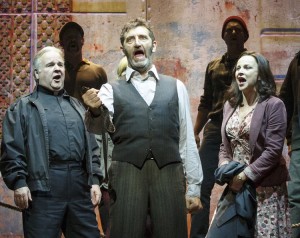The Last Ship, the new musical scored by Sting, has arrived on Broadway after a long gestation, including an Off-Broadway concert version at the Public Theater in 2013. The result falls into a niche of shows about the British working class and industrial strife. They include Billy Elliott, in which Margaret Thatcher is excoriated for breaking the miners’ union; A Time for Singing, a nearly forgotten, gloriously melodic 1966 musical about a Welsh miners’ strike that has just closed at the York Theatre; The Full Monty, whose unemployed steelworkers turn to stripping to survive; and The Boat Factory, a Northern Irish two-hander that visited the Brits Off Broadway series in 2013 and focused on a Belfast shipyard that had built the Titanic.
John Logan and Brian Yorkey’s book for The Last Ship mingles working-class lives and hard labor with a light-headed romanticism. The story follows Gideon Fletcher, the son of an autocratic mineworker who expects that Gideon (Collin Kelly-Sordelet plays him as a teenager; Michael Esper, as an adult) will grow up in the same line of work. But Gideon wants to get away from his small town, Wallsend, a suburb of Newcastle-upon-Tyne, in the north of England. Even after his father suffers a stroke and needs him to provide, Gideon plans an exit with his girlfriend Meg (Rachel Tucker). They talk romantic nonsense about becoming stowaways and pirates, but at the last minute she stays behind.
Fifteen years pass, and Gideon (Esper) returns to Wallsend for his father’s funeral, with the intention of settling down with Meg. His expectation that she’ll be ready to resume their love affair is, of course, foolish. She is living with a shipyard worker, Arthur (played with a confident level-headedness by Aaron Lazar), and she has a son, Tom (Kelly-Sordelet again), who is 15, and, even to those flummoxed by math, obviously Gideon’s.
The lyrics (also Sting’s) and book exalt the dignity of the laborers at the boatyard who are unemployed yet insist that the shipyard must reopen. The new owner, however, intends to convert it to handling junk and salvage. “What are we men without a task to complete?” lament the proud shipbuilders, who are scraping by. They scorn the offer of retraining, seize the shipyard, and sing, “Steel in the stockyard, iron in the soul/We’ll conjure up a ship where there used to be a hole/And the ship sets sail, and the tale gets told/And the only life we’ve known is in the shipyard.” Sting was born and raised in the community, and one can feel the truth of the camaraderie and frustration in these lives.
The men plan to build one last ship, one that hasn’t been commissioned by anyone. Who’s paying for it? Father O’Brien, a parish priest (played with dry ennui by Fred Applegate), who has siphoned the money from a church building fund. “A man’s work is a sacrament,” he says. If the premise seems preposterous, it is drawn from incidents in Scotland in the 1970s and in Poland more recently, though possibly given a more romanticized spin. In spite of the working-class trappings and David Zinn’s vivid chain-link fences metal ladders, and catwalks, The Last Ship is a fable. But there are unusual elements too: religion, redemption, and grace figure in the story to a startling extent.
Tucker’s Meg reacts to Gideon’s return as you might expect, acid at first, then softening. Lazar as the devoted, level-headed Arthur does a fine job making her choice difficult, offsetting Esper’s passion as Gideon.
The show survives by dint of gorgeous music, even when the plot bogs down. Sting’s rich score is varied and Celtic, strong on fiddles and drones. There’s a nice comic number to launch Act II, and a first-act powerhouse one called “Dead Man’s Boots” that Gideon delivers about his father. The love ballads and wild Celtic verve are amply supplied in Joe Mantello’s superb production. And Steven Hoggett has choreographed testosterone-infused, foot-stomping dances.
The book suffers from repetition, however. You may notice at the end of a song in the middle of Act II that you knew everything it tells you back in the middle of Act I, and wonder why the plot hasn’t moved more quickly. And the ending swells with romanticism without really solving the workers’ futures. As a piece of theater, The Last Ship is enjoyable to watch and listen to, and its message about the value and honor due to hard work is important. But whether it's completely satisfying may depend on your respect for a futile gesture.
The Last Ship plays at the Neil Simon Theater, 250 W. 52nd St. For tickets, call 877-250-2929, or visit Ticketmaster.com.



